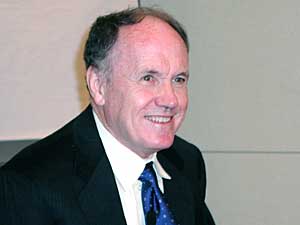|
Audio
Photos
Resources
Your Voice
|
Minnesotans host celebration for Nobel winner
October 12, 2004
Edward Prescott, the former University of Minnesota economist who shared this year's Nobel Prize for economics, shared in the celebration over his award during a visit to Minneapolis Tuesday. His colleagues praised his contributions to the field.
Minneapolis, Minn. — Edward Prescott, the former University of Minnesota economist who shared this year's Nobel Prize for economics, admits he had underestimated the significance of the award. Prescott spoke Tuesday at the Federal Reserve Bank of Minneapolis, where a reception in his honor is planned Tuesday evening.
Prescott splits his time between the Minneapolis Fed, where he is a senior monetary advisor, and Arizona State University. Prescott said he was in a daze Monday, when the prize was announced.
"I had a little bit of the attitude, 'Well, the research is there, that once the prize is awarded, that'll be nice, but it will not be a big thing.' But it is!" Prescott said.
Prescott, 63, and Finn E. Kydland, 60, of Norway were honored by the Royal Swedish Academy of Sciences for their work in determining the consistency of economic policy and the driving force behind business cycles worldwide.
"This is very exciting, and certainly well-deserved," said Gary Stern, president of the Federal Reserve Bank of Minneapolis. "(Prescott) has made some very important and exciting contributions to economics. Not only that - he has stimulated a lot of research from others and with others."
|
(Prescott) has made some very important and exciting
contributions to economics. Not only that - he has stimulated a lot
of research from others and with others.
- Gary Stern, president of the Federal Reserve Bank of Minneapolis |
Kydland teaches at Carnegie Mellon, a Pittsburgh school, and the University of California at Santa Barbara. The men will share a $1.3 million award for their research.
The academy said the men made fundamental contributions in showing that driving forces behind business cycle fluctuations and the design of economic policy are key areas in macroeconomic research - and also for the practice of monetary and fiscal policy in many countries.
Prescott said vast progress is being made in the field of economics.
"This is the golden era of economics. We are making such incredible progress in understanding things," he said. "I happen to be around the right place at the right time."
Stern, in explaining the research, said the pair's work on "consistency" shows that policy makers, rather than taking one course of action, may decide to pursue one policy - say, price stability - while at the same time adopting a small dose of another policy, such as inflation.
In their research on what drives business cycles, Prescott and Kydland determined that a "supply side shock" - such as a new technology that boosts production - may have a bigger effect on how the economy performs than traditional fiscal and monetary policy, Stern said.
Prescott provides information on all kinds of issues at the Federal Reserve, from productivity and employment to stock prices, he said.
"I ask Ed all sorts of questions," Stern said. "For example, one of the things I've asked him about is, 'Why has Japan struggled in the last 10 or 12 years? Help us understand their problems and why they have fallen so far below their performance of the 1970s and '80s.'"
V.V. Chari of the University of Minnesota was a student of Prescott's at Carnegie Mellon. Chari, who wrote his doctoral dissertation on business cycles, recalled that Prescott insisted he articulate his positions "in words that you could explain to your grandmother." Asked if Prescott often made him do things over, he said, "Not just once - hundreds of times!"
Art Rolnick, director of research at the Federal Reserve Bank of Minneapolis, said Prescott's diligence has helped turn the local Federal Reserve branch into a center for research. Thanks to Prescott's initiative, he said, University of Minnesota graduate students routinely work there as interns.
"He's just a major force in our profession," Rolnick said.
Prescott left the University of Minnesota last year. During his news conference, he acknowledged being unhappy with university administrators and with intervention at the university by state lawmakers.
(The Associated Press contributed to this report)
|
News Headlines
|
Related Subjects
|

